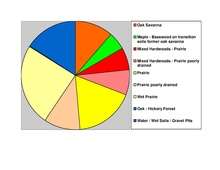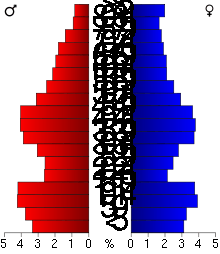Meeker County, Minnesota
| Meeker County, Minnesota | |
|---|---|
 Location in the U.S. state of Minnesota | |
 Minnesota's location in the U.S. | |
| Founded | February 23, 1856[1] |
| Named for | Bradley B. Meeker, an associate justice of Minnesota Territorial Court |
| Seat | Litchfield |
| Largest city | Litchfield |
| Area | |
| • Total | 645 sq mi (1,671 km2) |
| • Land | 608 sq mi (1,575 km2) |
| • Water | 37 sq mi (96 km2), 5.7% |
| Population (est.) | |
| • (2015) | 23,102 |
| • Density | 38/sq mi (15/km²) |
| Congressional district | 7th |
| Time zone | Central: UTC-6/-5 |
| Website |
www |
Meeker County is a county located in the U.S. state of Minnesota. As of the 2010 census, the population was 23,300.[2] Its county seat is Litchfield.[3]
History
The county was named after Bradley B. Meeker, an associate justice of the Minnesota Territorial Supreme Court from 1849 to 1853.[4]
Geography
According to the U.S. Census Bureau, the county has a total area of 645 square miles (1,670 km2), of which 608 square miles (1,570 km2) is land and 37 square miles (96 km2) (5.7%) is water.[5]

Major highways
 U.S. Highway 12
U.S. Highway 12 Minnesota State Highway 4
Minnesota State Highway 4 Minnesota State Highway 7
Minnesota State Highway 7 Minnesota State Highway 15
Minnesota State Highway 15 Minnesota State Highway 22
Minnesota State Highway 22 Minnesota State Highway 24
Minnesota State Highway 24 Minnesota State Highway 55
Minnesota State Highway 55
Adjacent counties
- Stearns County (north)
- Wright County (east)
- McLeod County (southeast)
- Renville County (southwest)
- Kandiyohi County (west)
Demographics
| Historical population | |||
|---|---|---|---|
| Census | Pop. | %± | |
| 1860 | 928 | — | |
| 1870 | 6,090 | 556.3% | |
| 1880 | 11,739 | 92.8% | |
| 1890 | 15,456 | 31.7% | |
| 1900 | 17,753 | 14.9% | |
| 1910 | 17,022 | −4.1% | |
| 1920 | 18,103 | 6.4% | |
| 1930 | 17,914 | −1.0% | |
| 1940 | 19,277 | 7.6% | |
| 1950 | 18,966 | −1.6% | |
| 1960 | 18,887 | −0.4% | |
| 1970 | 18,387 | −2.6% | |
| 1980 | 20,594 | 12.0% | |
| 1990 | 20,846 | 1.2% | |
| 2000 | 22,644 | 8.6% | |
| 2010 | 23,300 | 2.9% | |
| Est. 2015 | 23,102 | [7] | −0.8% |
| U.S. Decennial Census[8] 1790-1960[9] 1900-1990[10] 1990-2000[11] 2010-2015[2] | |||

As of the census of 2000,[12] there were 22,644 people, 8,590 households, and 6,133 families residing in the county. The population density was 37 people per square mile (14/km²). There were 9,821 housing units at an average density of 16 per square mile (6/km²). The racial makeup of the county was 97.35% White, 0.19% Black or African American, 0.18% Native American, 0.40% Asian, 1.40% from other races, and 0.48% from two or more races. 2.15% of the population were Hispanic or Latino of any race. 45.8% were of German, 12.2% Swedish and 11.3% Norwegian ancestry.
There were 8,590 households out of which 33.70% had children under the age of 18 living with them, 61.50% were married couples living together, 6.30% had a female householder with no husband present, and 28.60% were non-families. 24.40% of all households were made up of individuals and 12.00% had someone living alone who was 65 years of age or older. The average household size was 2.58 and the average family size was 3.07.
In the county the population was spread out with 27.00% under the age of 18, 7.40% from 18 to 24, 26.40% from 25 to 44, 23.00% from 45 to 64, and 16.30% who were 65 years of age or older. The median age was 38 years. For every 100 females there were 101.70 males. For every 100 females age 18 and over, there were 98.90 males.
The median income for a household in the county was $40,908, and the median income for a family was $47,923. Males had a median income of $33,157 versus $22,743 for females. The per capita income for the county was $18,628. About 4.70% of families and 7.10% of the population were below the poverty line, including 6.40% of those under age 18 and 13.80% of those age 65 or over.
Communities
Cities
- Cedar Mills
- Cosmos
- Darwin
- Dassel
- Eden Valley (partly in Stearns County)
- Grove City
- Kingston
- Litchfield (county seat)
- Watkins
Townships
- Acton Township
- Cedar Mills Township
- Collinwood Township
- Cosmos Township
- Danielson Township
- Darwin Township
- Dassel Township
- Ellsworth Township
- Forest City Township
- Forest Prairie Township
- Greenleaf Township
- Harvey Township
- Kingston Township
- Litchfield Township
- Manannah Township
- Swede Grove Township
- Union Grove Township
Unincorporated communities
See also
References
- ↑ "Minnesota Place Names". Minnesota Historical Society. Retrieved March 18, 2014.
- 1 2 "State & County QuickFacts". United States Census Bureau. Retrieved September 1, 2013.
- ↑ "Find a County". National Association of Counties. Archived from the original on May 31, 2011. Retrieved 2011-06-07.
- ↑ Gannett, Henry (1905). The Origin of Certain Place Names in the United States. U.S. Government Printing Office. p. 204.
- ↑ "2010 Census Gazetteer Files". United States Census Bureau. August 22, 2012. Retrieved October 21, 2014.
- ↑ Nelson, Steven (2011). Savanna Soils of Minnesota. Minnesota: Self. pp. 49-52. ISBN 978-0-615-50320-2.
- ↑ "County Totals Dataset: Population, Population Change and Estimated Components of Population Change: April 1, 2010 to July 1, 2015". Retrieved July 2, 2016.
- ↑ "U.S. Decennial Census". United States Census Bureau. Archived from the original on May 11, 2015. Retrieved October 21, 2014.
- ↑ "Historical Census Browser". University of Virginia Library. Retrieved October 21, 2014.
- ↑ "Population of Counties by Decennial Census: 1900 to 1990". United States Census Bureau. Retrieved October 21, 2014.
- ↑ "Census 2000 PHC-T-4. Ranking Tables for Counties: 1990 and 2000" (PDF). United States Census Bureau. Retrieved October 21, 2014.
- ↑ "American FactFinder". United States Census Bureau. Archived from the original on September 11, 2013. Retrieved 2008-01-31.
External links
 |
Stearns County |  | ||
| Kandiyohi County | |
Wright County | ||
| ||||
| | ||||
| Renville County | McLeod County |
Coordinates: 45°07′N 94°32′W / 45.12°N 94.53°W